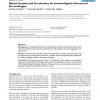159 search results - page 3 / 32 » Concept Analysis And Terminology: A Knowledge-Based Approach... |
BMCBI
2007
13 years 5 months ago
2007
Background: An adequate and expressive ontological representation of biological organisms and their parts requires formal reasoning mechanisms for their relations of physical aggr...
AAAI
2007
13 years 7 months ago
2007
The long-term goal of Project Halo is to build an application called Digital Aristotle that can answer questions on a variety of science topics and provide user and domain appropr...
ACMDIS
2006
ACM
13 years 11 months ago
2006
ACM
People often use powerful tools to manage the documents they encounter, but very rarely to store the mental knowledge they glean from those documents. Popcorn is a personal knowle...
AGILE
2007
Springer
2007
Springer
Towards Spatial Reasoning in the Semantic Web: A Hybrid Knowledge Representation System Architecture
13 years 11 months ago
Environmental databases store a wide variety of data from heterogeneous sources which are described with domain-specific terminologies and refer to distinct locations. In order to ...
NLDB
2005
Springer
13 years 10 months ago
2005
Springer
Requirements engineering is the Achilles’ heel of the whole software development process, because requirements documents are often inconsistent and incomplete. Misunderstandings ...

